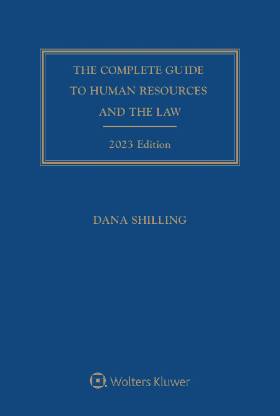The Complete Guide to Human Resources and the Law is an invaluable tool for the HR professional who needs to place legal principles and developments in the context of the practical problems he or she faces every day. The law as it relates to human resources issues is an ever-growing, ever-changing body of information that involves not just court cases but also statutes and the regulations of administrative agencies.
The Complete Guide to Human Resources and the Law brings you the most up-to-date information as well as practical tips and checklists in a well-organized, easy-to-use resource.
<!--read more-->
The 2023 Edition provides new and expanded coverage of issues such as:
- Hopes that COVID-19 concerns would fade away amid a return to normalcy were dashed by the Omicron variant, which caused yet another spike in infection rates and stressed-out hospitals. As a result, 2021 and the early part of 2022 were once again spent focused largely on the virus. Employer plans to return employees to the office were delayed and, in some cases, terminated, as employers began to rethink their business and human resources needs in a work environment under siege from what is transitioning to an endemic disease. Telework, telemedicine, tele-everything. COVID-19-related considerations for human resources departments affected everything from paid leave, sick leave credits, benefit plan relief, COBRA, the ADA, and vaccines to immigration. The full impact of those changes is not likely to be known for years.
- Whereas 2020 and early 2021 were marked by three big pieces of COVID-19 legislation—the Families First Coronavirus Response Act (FFCRA), the Coronavirus Aid, Relief, and Economic Security (CARES) Act, and the American Rescue Plan Act of 2021, all three of which impacted pensions and health plans—2021 and early 2022 were quieter on the legislative front as Democratic plans met Republican resistance in the Senate. The Health and Economic Recovery Omnibus Emergency Solutions Act (HEROES Act) passed the House, but not the Senate. It would have impacted payroll tax deductions, local farmers, and transportation needs, but its primary target was support for Medicaid, SNAP, and poor communities. A second related-but-trimmed-down version of the bill, which was referred to as HEROES Act 2.0, also failed in the Senate. Among the bills that did make it through in 2022 was the Consolidated Appropriations Act, 2021, which provided the largest COVID-19 relief package since the CARES Act. It extended unemployment benefits, provided new money for vaccine distribution and testing, re-funded the Paycheck Protection Program, provided more rental assistance, and sent out a new round of economic impact payments. Another bill, the Paycheck Protection Program & Health Care Enhancement Act, included a law called the No Surprises Act, which protects consumers from surprise and excessive cost-sharing for emergency services. A third law, the Infrastructure Investment and Jobs Act, included in its provisions a further extension of the American Rescue Plan Act's adjustments to pension funding.
- While COVID-19 raged on, the transition from the Trump administration to the Biden administration had a big impact on human resources offices, as much of what President Trump had done by executive order was undone by President Biden by executive order. For example, President Biden reversed a rule by the Trump administration's Department of Labor to discourage investment advisors from considering investments in ESG (environmental, social, and governance) causes. Another example was the Trump administration's decision to suspend all work visas for the duration of the pandemic, a decision that was reversed by the Biden administration. The Biden administration also reversed Trump administration policies on the Deferred Action for Childhood Arrivals (DACA) program and limits on immigration more generally.
- Lost in the focus on COVID-19, the fate of the Patient Protection and Affordable Care Act (PPACA)—a key focus for the previous few years—seems to have become more settled. In 2021, the Supreme Court ruled in a 7-2 decision that the Texas parties challenging the PPACA's validity could not bring their suit because they lacked standing in the absence of a concrete injury traceable to the defendant's conduct. That decision seems to have taken the steam out of efforts to undo the PPACA, at least for now.
- Speaking of the Supreme Court, it handed down what many are calling a landmark decision in Bostock v. Clayton County, Georgia, which held that employers cannot fire an individual merely for being gay or transgender. Furthermore, an employer cannot escape liability by citing to some other factor that brought about the employment action. As long as being gay or transgender was a factor, the employer violates Title VII.
- The states continued to experiment in legislative areas where either Congress has been reluctant to act or COVID-19 has forced them to act, such as in mandated coverages, background checks, noncompete agreements, concealed handguns at work, cannabis-related rules, pregnancy discrimination, breastfeeding accommodations, bargaining units, racial discrimination protections, equal pay, paid family leave, COVID leave, wage protections, and whistleblower protections.
- During 2021 and early 2022, probably the most frequently litigated topic—at least the one most commonly making its way through the appellate courts—was the scope of the fiduciary duty held by employer pension plans and their financial advisers. The courts were regularly ruling on everything from who qualifies as a fiduciary to what qualifies as a breach of the duty of prudence to how damages are calculated for a breach. Among the other hot topics in the past year worth following is a movement to prohibit noncompete agreements for any employees below an upper-level executive. Perhaps two of the more surprising developments were a decrease in health care costs for the first time ever (because of COVID-19) and news that the PBGC's financial picture brightened, after years of reports of its imminent demise (again, probably because of COVID-19).
